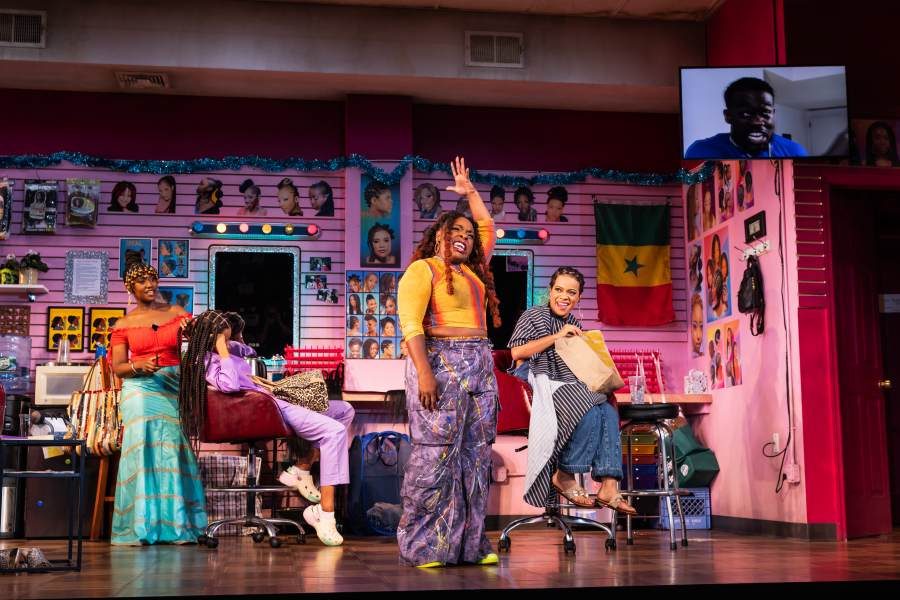
 photo by Matthew Murphy
photo by Matthew Murphy
Getting married and becoming an American citizen are two events in Jaja’s life. However, “Jaja’s African Hair Braiding” by Jocelyn Bion is more universal than that. It’s about sisterhood and a group of women connected by their lives and their dreams.
While Jaja prepares for her wedding, the ladies at her Harlem store are braiding customers’ hair. Although there’s a certain amount of excitement about the marriage, there’s some doubt as well. Much of that stems from Bea (superbly played by Zenzi Williams.) Bee is a busybody who knows it all and provides much of the humor. She is loud and unabashedly opinionated with something to say about everything. She claims loudly that the shop should really be hers since it was her idea and is hostile towards Ndidi claiming that she’s stolen some of her customers. Bea offers unsolicited advice, especially towards Aminata (Nana Mensah) and the status of her marriage with her philandering husband James.
Despite all her flaws or because of them, she’s a wonderfully entertaining character. (Terrific to watch but I’d hate to have to work with her!) Yet by the end, when there’s a crisis, Bea rises to the occasion and calmly assumes control.
Through the braiders, Playwright Bion tells several stories with women representing Sierra Leone, Nigeria, Ghana and Senegal. Their experiences are varied yet their bonds are strong. They share the dream of America and fears of ICE and deportation.
Ndidi (Maechi Aharanwa) is upbeat and willing to make amends with Bea. She gets to perform one of the show’s most entertaining scenes when she enacts the dialogue on the Bollywood episode on the TV at the salon.
Although we’ve seen many women sporting braids, few of us appreciate the time and effort that has gone into creating them. Braiding is difficult work and after Miriam spent the entire day doing mini-braids for a customer, the others insist that she soak her hands before they swell up. The work isn’t easy and neither are some of the customers. Some are so difficult that they provide laughs. When one particularly annoying one falls asleep, we are pleased as is the braider.
Several of the women have accents and it took me a while to become acclimated to them. All the action occurs inside Jaja’s salon ((colorful busy set design by David Zinn.)The play is surprisingly funny and upbeat for much of the 90 minute running time. Of course, there are heavy themes regarding the difficulties of obtaining citizenship and the sad realities of their lives and staying in the country. “Fine, I will go. But when do you want me to leave/ Before or after I raise your children? Or clean your house? Or cook your food?”“
The women at Jaja’s have a close knit connection and although they don’t have much, they share willingly. Jaja herself has shown generosity in giving Miriam a job when she first came to America and a chair when her store burned down.
Skillfully directed by Whitney White, the show is about celebrating African identity through hair and pursuing American dreams, but, more importantly, it reflects universal themes- the strength of women and the bonds of sisterhood.
Samuel J. Friedman Theatre
261 W. 47 th St.
New York, NY